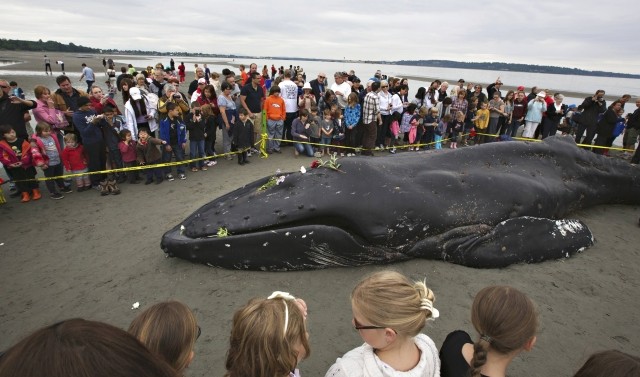Young Humpback Whale with Heavy Nylon Line in Mouth Washes up Alive at British Columbia Coast, Dies Soon After [PHOTOS]
The beaching of a young humpback whale (Megaptera novaeangliae), which was injured by a heavy nylon line entangled in its mouth, along the British Columbia coast has yet again raised concerns regarding human impact on the marine ecosystem.
The giant humpback whale, thought to be about three years old, was alive when it washed ashore at White Rock on Tuesday morning but died soon after, according to fisheries' officials. The mammal measured 8.5m long.
Although it is still unclear if the nylon line was commercial fishing gear, marine experts said the mammal had probably been entangled in the line for a long time and it was progressively more difficult for the animal to swim in deep waters, leading it to prefer shallow waters and eventually be beached.
"The beached whale had lacerations on its body that are indicative of rope entanglement. It was severely emaciated and had probably not eaten properly in a long time. The state of nutrition of the whale and scars from the gear suggest that the animal was entangled for weeks, or months," Dr Haulena, a Vancouver Aquarium veterinarian who examined the young humpback whale, said in a statement.
Humpback whales migrate from coastal Central America and Mexico to areas ranging from the coast of California to southern British Columbia in summer, according to the National Oceanic and Atmospheric Administration (NOAA). The recent beaching of the juvenile humpback whale at White Rock suggests humpback whales are making a comeback, in terms of numbers, along the west coast of British Columbia.
"Although, still considered at risk species due to the over-hunting that ended in the 1960s, the population is now doing better," Dr Lance Barrett-Lennard, a senior marine mammal researcher at the Vancouver Aquarium, said.
While the museum has collected DNA samples of the whale for further testing to identify the actual cause of its death, marine scientists do not rule out the possibility of an accidental encounter with fishing gear, which is one of the major threats to humpback whales. According to NOAA Fisheries, humpbacks can become entangled in fishing gear and either end up swimming off with the gear or becoming anchored.
"NOAA Fisheries has observed incidental take of humpback whales in the California/Oregon swordfish and thresher shark drift gillnet fishery. Potential entanglement from gear from several fisheries can occur on their long migration from Hawaii to Alaska. Humpbacks in Hawaii have been observed entangled in long line gear, crab pots, and other non-fishery-related lines," the NOAA reasons.
The photographs below show the carcass of the humpback whale that beached itself at White Rock, British Columbia...










© Copyright IBTimes 2025. All rights reserved.






















